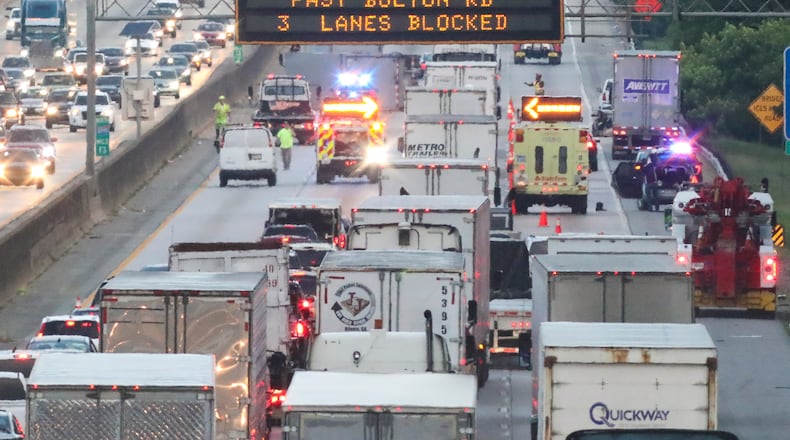A tractor trailer was ablaze on the Perimeter. All lanes were blocked. Traffic was at a standstill, and it didn’t get back to normal for hours.
But that traffic mishap on a recent Friday could have dragged on a lot longer without a Georgia Department of Transportation program designed to clear truck accidents quickly.
For more than a decade, GDOT has been paying private wrecking companies in metro Atlanta a bonus of up to $3,500 to clear truck accidents in 90 minutes or less. The Towing, Recovery and Incentive Program (TRIP) has proven so successful the agency may take it statewide.
The effort comes as freight traffic in Georgia is rising, thanks in part to the growing Port of Savannah. Already more than 20,000 trucks a day travel some metro Atlanta highways – and the volume is expected to increase steadily in coming decades.
That likely means more accidents involving trucks. One measure of the problem: Last year, GDOT used the TRIP program to clear truck accidents in metro Atlanta 258 times. In August of this year, it used the program 25 times – or nearly once a day, on average.
“This is all about trying to get roadways clear as quick as we can,” said State Traffic Engineer Andrew Heath. “We know that as an incident occurs, congestion builds very quickly.”
The TRIP program is just one way an agency better known for building roads tries to keep traffic moving on metro Atlanta highways. It also deploys scores of traffic cameras to monitor highway conditions. And it dispatches Highway Emergency Response Operators (HERO) units to assist motorists, clear debris and direct traffic following accidents.
Heath said those efforts are important because at least half the region’s traffic congestion is caused by accidents – everything from fender benders to truck mishaps like the ones the TRIP program is designed to clear.
“Anything we can do to get lanes cleared has tremendous benefit to the traveling public,” he said.
The TRIP program is used only in certain circumstances – when tractor trailers roll over, jackknife or catch fire, for example, or in collisions involving multiple trucks, large motor homes or motor coaches.
When such accidents happen, GDOT notifies towing companies that have been assigned specific regions (16 companies participate). They’re judged on how quickly they respond and remove the vehicle.
In addition to towing charges paid by the truck’s owner, the companies can earn up to $3,500 from GDOT if they clear the truck in 90 minutes or less.
GDOT launched the TRIP program in 2008 after some major accidents involving tractor trailers. Before, it took four and a half hours, on average, to get equipment to the scene and remove damaged trucks from highways. When the TRIP program began, the average time plummeted to less than two hours.
Heath said the bonuses give companies an incentive to make the truck accidents a priority. And GDOT ensures the participating companies have the proper equipment to respond to such accidents.
“We look at the incentive as prioritizing response with the right type of equipment already in place,” Heath said.
The program paid off during the Sept. 27 truck fire.
At 11:37 a.m., a GDOT worker monitoring traffic cameras spotted the fire on the northbound lanes at the Indian Creek MARTA station. The tractor trailer, loaded with 85,000 pounds of furniture, was fully engulfed.
While firefighters fought the blaze, GDOT called Chancey’s Wrecker Service. The company arrived 30 minutes later and waited until the blaze was extinguished and it was cleared to remove the truck.
It then took 47 minutes to remove the vehicle. Counting its travel time, it took Chauncey’s 77 minutes to clear the vehicle.
It took a while for traffic to return to normal. But without the TRIP program, Heath said the traffic mess could have lasted a lot longer.
Wrecker companies say the program works by setting clear goals and rewards.
“Everybody knows what the game is,” said Chris Welchel, co-owner of Marietta Wrecker Service. “When you know what the game is and you know how to keep score, everybody’s motivated.”
Paris Blaylock, manager at Barrow Wrecker Service in Smyrna, said his company now models its response to other calls on the fast-response TRIP program. “I’m proud to be a part of it,” he said.
In 2017 GDOT paid companies about $570,000 in bonuses through the TRIP program. A 2011 consultant’s study found the program saved travelers time, gas money and other costs worth about 11 times the state’s investment.
Now GDOT is considering taking the TRIP program statewide. With freight traffic on the rise, truck accidents have become a problem on highways like I-95 and I-16.
GDOT is talking to wrecker companies and studying the costs of an expansion. The agency expects to make a decision next year.
“We’ve seen tremendous success,” Heath said. “We know these types of accidents don’t just happen in metro Atlanta.”
Clearing truck accident
How often a GDOT program to clear truck accidents in metro Atlanta has been used in recent years.
2015: 145 times
2016: 125 times
2017: 192 times
2018: 258 times
SOURCE: GDOT
About the Author
Keep Reading
The Latest
Featured




